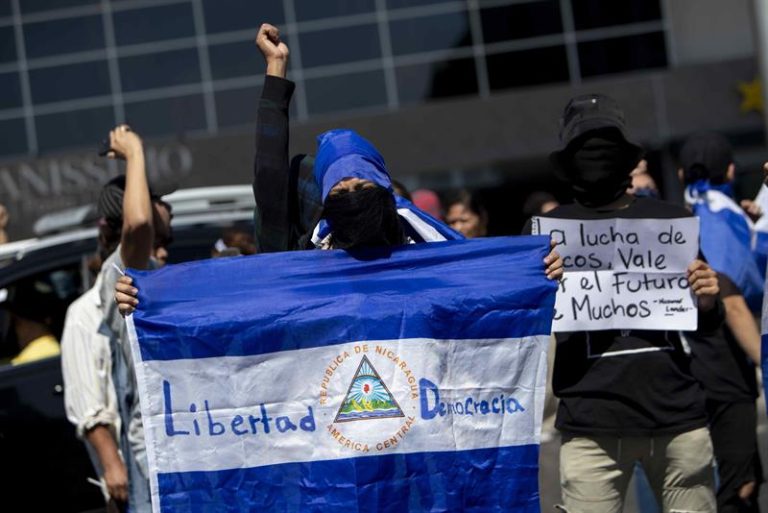4 de febrero 2022

The Return of the Military

PUBLICIDAD 1M
PUBLICIDAD 4D
PUBLICIDAD 5D
Alexandro Alvarez, former MESENI coordinator, explains the options for prosecuting those who acted against the Nicaraguan people.

The other way to seek justice and reparation for the victims
Although Nicaragua is not a signatory of the Rome Statute, which allowed the creation of the International Criminal Court (ICC), international law still offers options for an eventual criminal trial against those officials of the Ortega-Murillo regime accused of committing crimes against humanity.
The visit in 2018 of the Interdisciplinary Group of Independent Experts (GIEI), and the work of the Special Monitoring Mechanism for Nicaragua (MESENI), allowed for the collection of sufficient information and evidence to affirm that crimes against humanity were committed in the country, which opens the doors to begin international trials.
The initial options are two: those offered by the continental system, in this case, through the Inter-American Commission on Human Rights, and the ICC, which is of universal character, although in both cases there would be many technical and legal hurdles to overcome, indicated Alexandro Alvarez, former coordinator of MESENI.
In the case of the continental option, the expert explained that the Inter-American Commission on Human Rights, together with the victims, is the one who presents the accusations before the Court, to hear cases related to the violation of the “catalog of rights” contained in the American Convention on Human Rights.
In this case, the Commission executes and prepares the procedural part, making sure that the crime to be judged is one of those covered by the Court, but also that the victims have finished exhausting the national legal instances.
In the case of Nicaragua, it is possible to avoid this requirement, since it can be argued that the system does not work, given that there is no independent administration of justice in the country, explained the expert during a conference entitled “Crimes against humanity and International litigation for exiled communities,” organized by the group Hagamos Democracia.
Alvarez recalled that these are lengthy processes, which may require eight to nine years of litigation, but there are ways to speed up the processes when there is an urgency such as the one Nicaragua is experiencing.
The other way to seek justice and reparation for the victims, and healing for Nicaraguan society, is to go before the International Criminal Court. And, although it is true, that Nicaragua is not party to the Rome Statute, and therefore the ICC cannot judge crimes committed in the country, the catalog of crimes covered by the Statute is part of customary law.
The term refers to “a law that existed before the Statute, so it constitutes mandatory and imperative norms for all states, beyond their will,” he explained.
“There are some doors to be opened and actions to exercise, such as universal jurisdiction, but the system is not easy,” added the scholar.
In this regard, he recalled that universal jurisdiction allows for the prosecution in other countries of crimes such as those committed against the Nicaraguan population, although this depends on the existence of a link with the crime being prosecuted.
Applying this legal principle could allow the Brazilian State to open a case for the death of Dr. Raineia Lima, or the United States to do the same for the murder in prison of Eddy Montes, who had obtained the citizenship of that country.
As an example, he mentioned the trials being held in Spain against the Salvadoran military officers who murdered the Spanish priests at the UCA in San Salvador, but in this case, the Iberian courts could do so because they were demanding justice for their fellow citizens.
This was also the argument for Spain to ask London for the arrest of General Augusto Pinochet, or the case of a Chilean military man tried in Miami and sentenced to pay compensation to the family of the also Chilean Victor Jara.
Finally, he explained that the decision of the regime to withdraw the passports of some citizens “could be part of the crime of persecution, but normally this simple fact is not enough. Rather, it could be classified as a violation of the right of mobilization, according to the American Convention.”
This article was originally published in Spanish in Confidencial and translated by Havana Times
PUBLICIDAD 3M
Periodista nicaragüense, exiliado en Costa Rica. Durante más de veinte años se ha desempeñado en CONFIDENCIAL como periodista de Economía. Antes trabajó en el semanario La Crónica, el diario La Prensa y El Nuevo Diario. Además, ha publicado en el Diario de Hoy, de El Salvador. Ha ganado en dos ocasiones el Premio a la Excelencia en Periodismo Pedro Joaquín Chamorro Cardenal, en Nicaragua.
PUBLICIDAD 3D